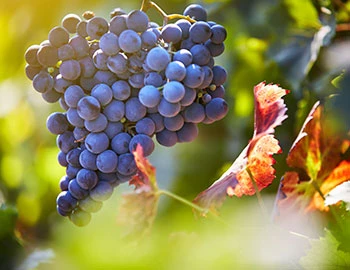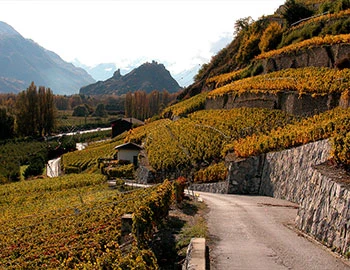Syrah Prés des Pierres Vieilles Vignes 2014
AOC Valais, Didier Joris, 1500 ml

| Grape variety: | Syrah |
| Producer: | Didier Joris |
| Origin: | Switzerland / Wallis |
| Other vintages: |
Description
Purple-black colour of enormous concentration. Aromas of black pepper, clove, smoke and leather. On palate the wine is powerful with a big, balanced body. The tannins are firm and forward, assuring longevity. This wine reflects Didier Joris' passion for great Syrah from the Rhone Valley.
Attributes
| Origin: | Switzerland / Wallis |
| Grape variety: | Syrah |
| Label: | Vegan |
| Ripening potential: | 2 to 8 years |
| Drinking temperature: | 16 to 18 °C |
| Food Pairing: | Saddle of lamb fillet with herb jus, Roasted lamb gigot, Roast saddle of venison, Wild boar entrecôte with Spätzli, Wild specialities, Wild fowl |
| Vinification: | cooling period, long must fermentation, Punching down |
| Harvest: | hand-picking |
| Maturation: | short cultivation, in partly new and used barriques/ Pièces |
| Bottling: | filtration |
| Maturation duration: | 7 months |
| Volume: | 13.0 % |
| Note: | Contains sulphites |
Didier Joris
Didier Joris is a legendary figure in the Valais, where the history of wine would be unthinkable without him. He grew up in a farming family that initially concentrated on raising cattle. To this very day, Didier still raves about «his Queens», the Hérens fighting cows. It was only during the 1960s and 1970s that the Joris family began to terrace slopes to plant vines and cultivate vineyards.
As the family did not have much expertise in this sector at that time, young Didier attended the Agricultural College of Châteauneuf. From there he went on to complete an internship in Germany, where he not only gained experience in viticulture, but also as a baker, butcher and in wine laboratories. After qualifying at Changins, he began working as a lecturer and researcher at the College of Oenology and Viticulture at the age of 21. He taught such greats as Marie-Thérèse Chappaz, Jean-René Germanier, Denis Mercier, Marie Bernard Gillioz and numerous other talents.

Syrah
A hint of pepper
The legend stubbornly persists that the Syrah variety came from the Persian city of Shiraz. Yet, researchers have shown that it is a natural crossing of two old French varieties: the red Dureza from the Rhône Valley and the white Mondeuse blanche from Savoy. Wines from Syrah are gentle and concentrated. They smell of dark berries, violets and liquorice, and amaze with a piquant touch of white pepper. As varietal wines, they are found on the northern Rhone, as in the Hermitage or Côte Rôtie appellations, as well as in Swiss Valais. In the southern Rhône Valley, Syrah is often wedded with Grenache and Mourvèdre. In 1832, a Frenchman brought the variety to Australia, where it became the emblem of the national wine industry. There, the weightiest versions develop with typical notes of tar and chocolate.

Switzerland
Switzerland – A small country with enormous diversity
Switzerland is famous for its banks, watches, and cheese, but not necessarily for its wine. The Swiss didn't invent wine, but they have been extremely open and curious to it. Wine culture arrived in what is now modern Switzerland via several routes: from Marseilles to Lake Geneva and the Lower Valais region; from the Aosta Valley through the Great St. Bernard Pass to the rest of Valais; from the Rhone through Burgundy, across the Jura Mountains to Lake Constance; and from Lombardy to Ticino, and then on to Grisons.



